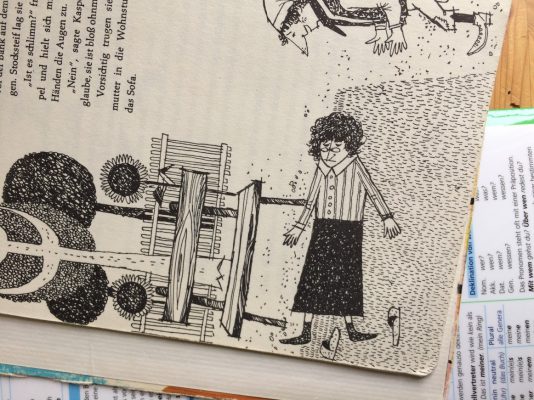Herr Pons und Der Räuber Hotzenplotz
Since resuming my study of the German language, there have been some notable changes in the line-up of arsenal in my assigned mission „Operation Conquer Deutsch„.
Once upon a time way back in wee old Ireland, life was simple and straightforward: my tools of learning consisted of a pencil; a book containing all my own notes; and an ancient edition of a scintillating textbook, a relic of the 1980s beloved by every German-teacher in Ireland. Now and then I mixed it up by acquiring a copy of the Die Welt newspaper from our local newsagents, a very exotic publication in our small country town, which had to be special-ordered and which I read from cover-to-cover until it fell apart.
These days however, as learners of a foreign language, we have more assistance possibilities than a person could possibly avail of at any one time. As children of the digital-age, the advances in technology promise a surer, speedier path to learning success. There are iPads and Kindles; smartphones and smartwatches; Alexa, Echo and the Cloud. On the infinite horizon that is the internet, we find an unending number of aids which one can make use of: from Babylon and LEO online dictionaries, to our dear friend Google Translate (who is full of buoyant self-assurance but who sadly, is not to be trusted); from Babbel and DuoLingo, to YouTube channels – each pledging an easier, swifter, more user-friendly, less brain-taxing method to gain fluency in a foreign-language.
Meanwhile in the home-library, the resources continue. I am offered security through Sicher! or a refreshed outlook via Aspekt neu; B Grammatik offers reams of Übungsmoglichkeiten, whilst Detective Inspector em Übungsgrammatik catches me out with delightful regularity. That wise and faithful old stalwart, Mr. Duden-Oxford Dictionary attempts to keep order amongst the various publications vying for attention on the bookshelf, accompanying me as he does through the rabbit holes of German vocabulary etymology (far more interesting, but sadly a lot less practical unless one is attending a quiz-competition…). I have enough grammar tables that I could build a Stammtisch sufficiently large to invite the entire student-body of Deutsch Akademie, with room to spare for additional guests. Capping it all off – and most strict of all – is Herr Professor Pons, who promises Deutsch Grammatik success „auf einen Blick“ and brooks no argument when it comes to mystifying irregularities. And yet despite the range of expert consultants, still, I get caught out. Word order, cases, conjunctions and modal verbs all offer an exciting array of opportunities for error. Even the definite article is not to be taken as definitive – there is always another possibility!
The fact of the matter is there is no shortcut to language success. Certainly, one can grasp the rudimentary rules quite quickly and then, with relative ease, continue to collect the various regulations and guidelines which govern a particular language. But no matter how many all-singing, all-dancing aids we have at our disposal, it will be of no assistance if we are overloaded and try to cram in too much information in too short a time-period. In fact, in my experience the greatest success is achieved through simple, old-school reiteration and self-teaching: as surely, when we can explain something to ourselves, we can allow for a sufficient degree of mastery on a particular point.
More than that however, unlike chapters in a book or steps on the EU Language Framework, there is no way one can skip over the absorption of a means of communication into one’s brain, into one’s way of thinking – that is, the integration into a culture: into the mindset of a people, a way of viewing the world which has run in a certain mode for centuries, so much so that it has formed the way communication is exercised. This is the trick and develops from the degree to which we are fully invested in a culture – unconsciously giving all our attention to succeeding so that we may communicate with those with whom we live our lives. Being “sprach – los” really is a humbling experience, as we realise the poverty which stems from not being able to give ourselves through thought and speech. Language is the essential foundation upon which we build this communication and allows the blossoming of our personalities in a new environment, without which we can never possibly hope to express or understand the fine subtleties which comprise every interaction with our families, friends and wider communities.
Thankfully, I have a undercover gang who are rooting for my success in their language: Karlsson vom Dach, Der Räuber Hotzenplotz and Asterix & Obelix – all providing a much-needed relief from the hard-headed attitude of the textbooks. The next time you need a break from grammar-tables and exercise sheets, volunteer to take care of your friend’s little child for an hour or two, or read to the neighbour’s children and enjoy the mutual mirth generated from struggling to read to children in their native language – a method of learning which I highly recommend! 🙂 Above all things though, at the end of the day it is important to remember that, although the path to language-success is certainly not plain-sailing, we should quietly rejoice at each increasing degree of communicability, however imperceptible it may be to those onlookers and we need only realise that communication itself is an exercise in time, persistence and patience. Keep up the good work!
Aoífe-Maria Beglin

